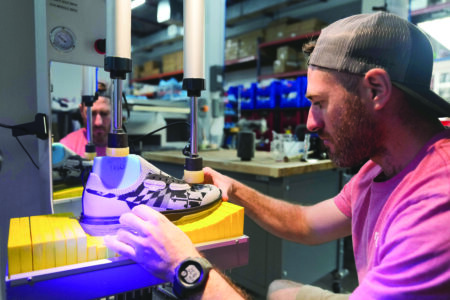Asahi course offered at NMU
Keeping a mind-body balance the Nordic way

Don Bode of Negaunee Township practices Asahi on Monday at Vandament Arena at Northern Michigan University. The Finnish mind-body health practice is for people of all ages and levels of health. (Journal photo by Christie Mastric)
- Don Bode of Negaunee Township practices Asahi on Monday at Vandament Arena at Northern Michigan University. The Finnish mind-body health practice is for people of all ages and levels of health. (Journal photo by Christie Mastric)
- Margaret Vainio, visiting from Finland, teaches Asahi on Monday at Vandament Arena. (Journal photo by Christie Mastric)
And you don’t need a sauna or reindeer.
A Nordic health practice called Asahi is being taught at Vandament Arena at Northern Michigan University’s Physical Education Instructional Facility, an introduction of sorts to the campus and community.
Asahi is defined as a Finnish mind-body health practice designed for people off all ages and states of health. A group of professional health and medical experts in Finland, including a geriatric and internal medicine specialist as well as a mindfulness trainer, developed Asahi in 2004, according to an NMU course handout.
NMU, by the way, is the first university in the U.S. to offer Asahi-Nordic as an official course.

Margaret Vainio, visiting from Finland, teaches Asahi on Monday at Vandament Arena. (Journal photo by Christie Mastric)
Marsha Lucas, a certified Asahi instructor, took part in Monday’s class at Vandament Arena.
She acknowledged that NMU students aren’t aware of the practice.
“We’re trying to be a presence on campus,” Lucas said.
However, Asahi was taught at Presque Isle Park and at Mattson Lower Harbor Park throughout the summer and fall, with Lucas teaching several classes during the winter at Presque Isle too.
“Everything is gentle motion, so you don’t need any kind of mats,” Lucas said. “You can do it sitting down, lying down. People in hospitals can do it. My cousin is a paraplegic, and he does it in his wheelchair, and he feels good about it.”
The handout Lucas provided the students went into detail about how Asahi works.
Asahi’s movement series are performed slowly and with full concentration, with each series composed of three movements. The first series relaxes the body and mind, while the next three focus on the chest and shoulder area. The next target area is the back, and the last series develops balance and strengthens the legs.
Principles that govern Asahi are:
≤ staying relaxed while practicing;
≤ working in a peaceful way;
≤ combining breath and movement;
≤ moving flowingly;
≤ being aware of good body alignment;
≤ continuous gentle expansion and constriction of muscles to improve circulation of blood, lymph and synovial fluid;
≤ using the kinetic chain of joints;
≤ working toward and practicing good posture and balance;
≤ twisting in spiral movements; and
≤ being mindful of body sensations.
Margaret Vainio, who attended NMU but now lives in Finland, trained Lucas and six other teachers. She led Monday’s session, having returned to the area for a while to start the Asahi project.
She believes people can get a lot out of Asahi, especially during the COVID-19 pandemic.
“People have been shut in their houses and they’re mentally depressed and they’re physically inactive,” Vainio said.
However, she stressed that at NMU, Asahi is practiced at a proper social distance of 6 feet.
It’s also not high impact.
Vainio gently gave class participants instruction on the movements, such as, “The idea is to work on the upper part of your back.”
Asahi strengthens the body and tones the muscles, but Vainio pointed out there are other healthy benefits
“It also helps clear your mind,” she said. “It’s a form of meditation or a form of mindfulness. You’re concentrating on movement and breathing and your mind can relax.”
Individuals interested in Asahi can email Vainio at margaret.vainio@gmail.com. The Vandament Arena classes take place from 11 to 11:50 a.m. Monday and Wednesday at PEIF 160.
Don Bode, of Negaunee Township, also took part in the Monday class.
His interest in Asahi came about by accident. He signed up for the class after witnessing people participating in Asahi while he was on a bike ride with friends by the Lower Harbor in the city of Marquette.
“Some of the movements they were doing seemed to be a combination of yoga and tai chi, and I found both of those helpful with osteoarthritis,” Bode said. “So I stuck around after class and asked if I could participate.”
He was told he could.
Sticking around turned out to be a good move.
“It’s very therapeutic,” Bode said. “It’s easy to do, and I feel quite energized afterwards. It’s so interesting for me that I’ve chosen to pursue it and become an instructor.”
Christie Mastric can be reached at 906-228-2500, ext. 250. Her email address is cbleck@miningjournal.net.







